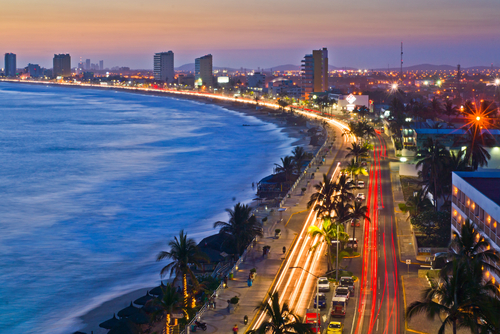1. Old Mazatlan
Evocative and haunting even in its tumble-down days, the spot where the Spanish conquerors established the city in the mid-1500s has been gloriously revitalized and is now the fulcrum of Mazatlan’s burgeoning art scene. Elegant 19th century buildings bloom with cafes, clubs and crafts galleries. Streets around Plazuela Machado, the Spanish settlement’s original central square, are filled with street theater, photo exhibits and parades by day; at night, when restaurants and bars move their tables into the street and open their shuttered second-story doors to drink in the festive mood.
2. Nonstop culture
The Angela Peralta Theater, the 1874 opera house whose 1992 restoration launched the rehab of Old Mazatlan, now hosts a steady schedule of events, ranging from the state symphony to a local children’s chorus to visiting jazz bands. The restoration gave rise to the annual Mazatlan Cultural Festival, which hosts dozens of music, ballet, theater, movie and comedy events from early November into mid-December. Almost any visit is bound to coincide with a cultural festival, whether it’s the State Festival of Arts, the International Dance Festival, the Mazatlan International Film Festival, the Mazatlan Book and Arts Fair or the International Guitar Festival, all of which bring in international celebrities.
3. Carnival
Only Río and New Orleans can claim a bigger Carnival celebration than Mazatlan, which sees more than 400,000 costumed revelers throng its streets and beaches. In addition to the big procession, Mazatlan’s festival brings roving mariachis, regional rock bands, art and literature programs, fireworks, amusement park rides and culinary festivals starring pescado zarandeado, the regional barbecued fish. If you miss the celebration, stop by the Casa Machado Museum and visit the Carnaval parlor, which displays glittery costumes, historical panels, and photographs of Carnaval queens going back to 1900.
4. The Malecon
The stretch of the seafront boulevard known as Olas Altas (“high waves”) as it skirts the historic district is Old Mexico at its best, full of seats overlooking the ocean, vendors pushing carts, workers taking a break and families enjoying the air. The land side of the boulevard is conveniently lined with cafes, and you can detour up Cerro Neveria (“Icehouse Hill”).. Walking the malecón can easily occupy a day, especially if you stop along the way to play catch with the waves, get a cool drink.
5. El Faro
At the top of Cerro Creston, Mazatlan’s tallest hill, El Faro’s (“the lighthouse”) 515-foot elevation qualifies it as the world’s second-highest lighthouse. At sunset, you can work off your fresh seafood dinner by climbing to the lighthouse — about 30 to 45 minutes from the base of the hill — for an incomparable view of the twinkling city 500 feet below.
6. Isla de las Piedras
“Stone Island” , palapa restaurants selling fresh fishermen’s catches, ATVs, banana boats, horseback riding, a golf course and the only seahorse farm ,delightful way to enjoy the beach away from urban distractions ,but only 10 minutes away by water taxi.
7. Béisbol game
From October through December, you can see baseball played, and cheered, with a distinctly Mexican passion. Los Venados (“the deer”), Mazatlan’s Pacific League team, usually have a few American AAA players. Los Venados has made the January playoffs for 10 years running and won the Mexican championship in 2008. Last year, they represented Mexico in the Caribbean World Series
8. Fishing
The big marlin, swordfish and sailfish that lured the likes of John Wayne and Ernest Hemingway in decades past are still jumping, and Mazatlan has some of the most experienced and competent captains in the world for sportfishing. Several licensed flotas deportivas (“sports fleets”) of varying sizes line up along the jetty road beneath El Faro; word has it each boat usually returns with an average of three whopping billfish a day in season (October-May).

